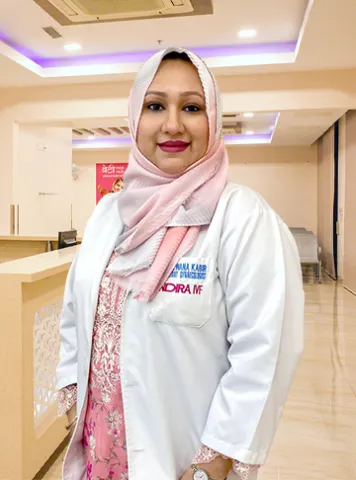What is Endometriosis?
Endometriosis is a long-term medical condition recognised by the growth of tissue with similar properties to the tissue lining the womb (endometrium) outside the womb. This misplaced tissue may be found in or on the ovaries, fallopian tubes, pelvic walls, and occasionally beyond the pelvic region. These outgrown tissues behave just like uterine tissue. That is, it will thicken and bleed during the menstrual cycle. However, unlike menstruation, the blood has no outlet from the body.
This trapped blood and tissue can result in inflammation, scar tissue, and painful adhesions binding organs. Eventually, this may result in symptoms such as severe cramps during menstruation, pelvic pain, pain during sex, and, in some cases, infertility.
Endometriosis affects around 10% women worldwide, primarily in their reproductive years, and is often underdiagnosed, as many women assume that severe pain associated with periods is "normal” when it is not.
The Link Between Endometriosis and Infertility
One of the most concerning aspects of endometriosis is its close link with infertility. That is, among all women with endometriosis, 30–50% ultimately have difficulty conceiving, making it one of the most prevalent causes of infertility in women globally. Yet, it is important to note that endometriosis may not always result in infertility; that is, many women with this disorder can still conceive without any intervention. In fact, some women may benefit from timely medical or fertility treatments.
Besides, the severity of the disease, age, ovarian health, and other variables all impact the degree of the complication. Early awareness and diagnosis of endometriosis infertility Bangladesh are especially important for this reason.
How Endometriosis Affects Fertility
Endometriosis is a serious threat to the fertility of a woman, and here is how endometriosis and fertility Bangladesh are connected:
- Inflammatory environment – Long-term after-effects of pelvic inflammation affect the function of the sperm and egg, decreasing the chances of fertilisation.
- Reduced implantation rates – Inflammation may inhibit and/or limit the embryo from embedding into the uterine lining, even if fertilisation occurs.
- Poor egg quality – Increased inflammation and formation of cysts (endometriomas) due to endometriosis decreases egg quality, which is released from the ovaries.
- Reduced ovarian reserve – Mostly, women with moderate or severe levels of endometriosis have a decreased ovarian reserve. Therefore, not many healthy eggs are present for conception, ultimately causing infertility in women.
- Painful intercourse – Painful sex, also known as Dyspareunia, can reduce sexual activity, eventually reducing the chance of conception.
- Abnormal pelvic anatomy – Adhesions and scar tissue caused by unusual growth can change the shape of the fallopian tubes or ovaries, making it difficult for sperm to meet the egg.
- Blocked fallopian tubes – Abnormal tissue growth during endometriosis can also result in partial or complete blocking of the fallopian tubes, ultimately cutting the chances of fertilisation.
Degrees of Risk: Not Every Woman Becomes Infertile
Endometriosis can be a threat to fertility in women, but that does not always mean that it will always result in infertility. In fact, there are some contributing factors which decide the outcome of this disorder, which include:
- Severity of Endometriosis: With mild endometriosis, there are still good chances for natural conception, but in cases of moderate to severe endometriosis, it can be more challenging for fertility.
- Location of Lesion – The result of endometriosis, that is, a lesion on the fallopian tubes or ovaries, is more serious and negative for fertility than lesions in other locations in the uterus.
- Age – Fertility declines naturally as we age, and this decline in fertility, along with endometriosis, can worsen the chances of conceiving for women.
- Ovarian Reserve – The number of eggs present in the ovaries is termed ovarian reserve, and women with a greater number of healthy eggs have a better chance of getting pregnant naturally than their counterparts.
- Partners Fertility – Not being able to conceive is not always connected to endometriosis; male partners can also contribute to the overall chances of getting pregnant.
- Diagnosis and Treatment – When it comes to endometriosis, the timing of treatment is equally important as the type of treatment used. Hence, early detection and appropriate treatment can help manage fertility in women significantly.
Can Women with Endometriosis Become Mothers?
In one word, yes, women with endometriosis can become mothers. After analysing risk factors and how endometriosis affects the body, we understand that while endometriosis can complicate conception from scarring, inflammation, or ovarian cysts, it doesn't mean that infertility is an absolute outcome for this disorder. Many women with mild to moderate endometriosis have achieved natural pregnancies, sometimes without any medical intervention.
Even for women who struggle with infertility due to endometriosis, there are many fertility treatments that can increase the chances of getting pregnant.
Symptoms to Watch For
As mentioned earlier, early diagnosis is very important to bypass the severe complications of endometriosis and ultimately infertility. Immediately seek medical help if you experience any of these endometriosis symptoms Bangladesh:
- Severe menstrual cramps - Discomfort during your period that limits your daily activities.
- Chronic pelvic pain - Pain and/or discomfort located in the pelvic area that is present even when you are not on your period.
- Heavy or irregular periods: Bleeding that is very heavy during your period or bleeding intermittently that is very light, very heavy, or stops and starts.
- Painful bowel movements or urination: Pain associated with bowel movements or urination, especially when you're on your period.
- Pain during intercourse: Pain and/or discomfort during and/or after sexual intercourse.
- Difficulties conceiving - Difficulty getting pregnant, or being unable to become pregnant even after regular unprotected sex for more than a year.
Treatment Options
Endometriosis may be a serious concern for infertility in females, but fortunately, with advancements in medical technology, treatment for this disorder is now within reach. Some of the options for endometriosis treatment Bangladesh include:
- Laparoscopic Surgery – This minimally invasive surgery removes endometriotic lesions, adhesions, and ovarian cysts with the goal of restoring pelvic anatomy.
- Intrauterine Insemination (IUI) - This type of fertility treatment involves placing sperm directly into the uterus, which may increase the chance of fertilisation, in cases of mild infertility.
- In Vitro Fertilisation (IVF) - This type of assisted reproduction may allow for the fertilisation of the eggs when the fallopian tubes are blocked or the egg quality is quite poor, usually recommended in moderate to severe endometriosis cases.
- Egg Preservation - Egg preservation is an option to preserve ovarian reserve and fertility for women of childbearing age, especially in their 20s and 30s, while going through treatment for endometriosis at an earlier age.
- Lifestyle Support – Balanced diet, exercise, and effective stress relief can support medical interventions and improve reproductive outcomes.
Conclusion
In summary, endometriosis is a complicated disease that can impact physical health and fertility, but it does not equate to the end of the desire to be a mother. While challenges may exist with the disease, many women achieve pregnancy either naturally or with medical assistance (surgery, IUI, IVF). Early endometriosis diagnosis Bangladesh and treatment, a tailored approach to management, and supportive lifestyle strategies can enhance fertility and lead to an opportunity for conception. The ability to understand the disease and take action when needed allows women to take charge of their reproductive health, manage endo symptoms, and pursue an opportunity for pregnancy with hope and confidence.
Frequently Asked Questions
Is it possible for women who suffer from endometriosis to become pregnant without intervention?
Does having endometriosis mean all women will be infertile?
What effect does endometriosis have on infertility?
If a woman has endometriosis, can surgery help with fertility?
Is IVF effective for women with endometriosis?
Can making any lifestyle changes improve the fertility of those who have endometriosis?
How could endometriosis affect someone's emotional health?
Can pregnancy benefit endometriosis once a woman has signs that she is pregnant?
Table of Contents
Meet Top Fertility Specialists in Bangladesh at Indira IVF

Dr. Umme Ruman
Chief Infertility Specialist, MBBS(DU), FCPS(Obstetrics and Gynaecology), Fellowship in Assisted reproduction
Dr. Umme Ruman is a BMDC-registered infertility specialist based in Dhaka. She holds advanced qualifications in assisted reproductive techniques, sexual and reproductive medicine. Dr. Ruman serves as a Chief Consultant at Indira IVF Dhaka, helping patients with personalised fertility care based on her vast experience and expertise. Her knowledge and compassion will support couples navigating reproductive health challenges and guide them effectively towards their parenthood dreams.

Dr. Rezwana Kabir
IVF specialist, MBBS (SSMC), MS (Obstetrics and Gynaecology), Fellowship in Assisted reproduction
Dr. Rezwana Kabir is a BMDC-registered specialist in obstetrics and gynaecology, and now a part of Indira IVF’s team of fertility specialists in Bangladesh. She combines medical proficiency with a patient-centric approach, offering tailored solutions to couples seeking fertility assistance. She is committed to helping individuals confidently navigate the journey to parenthood through ethical, empathetic, and evidence-based care.
.


